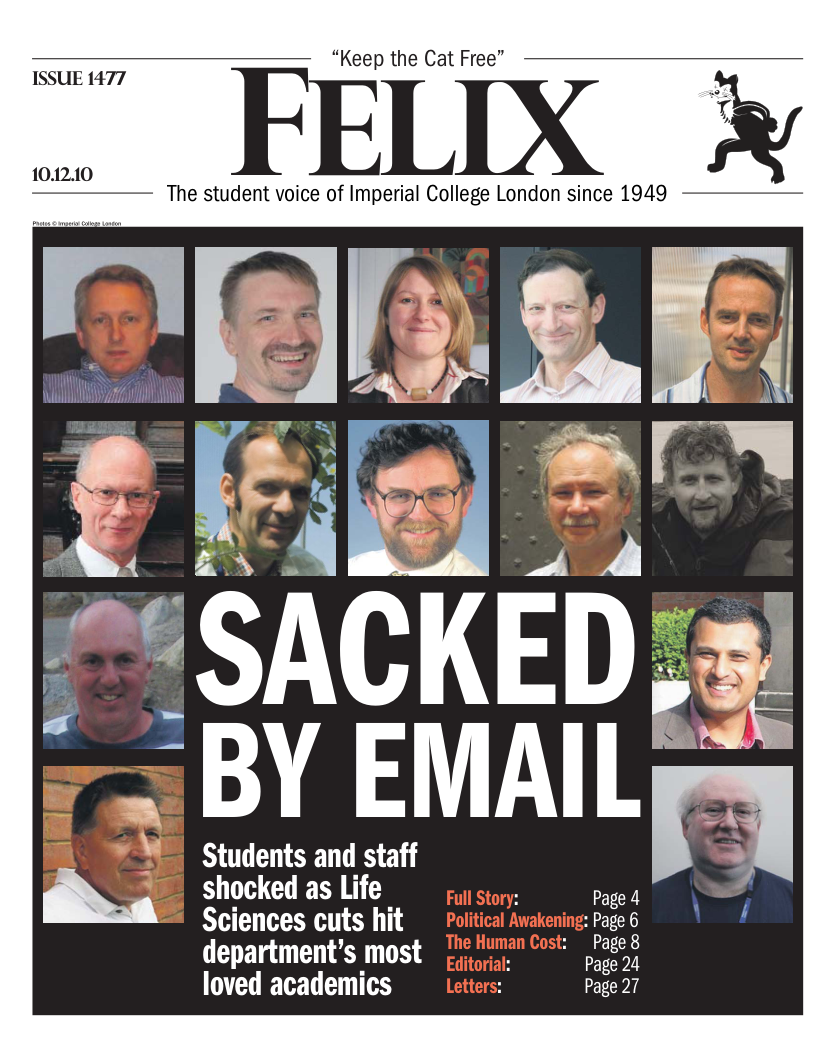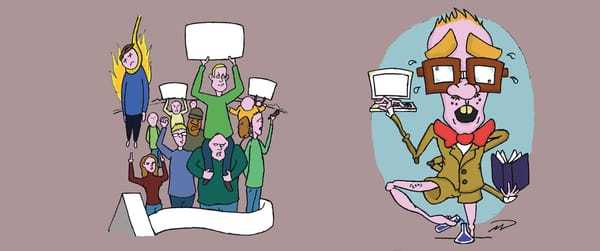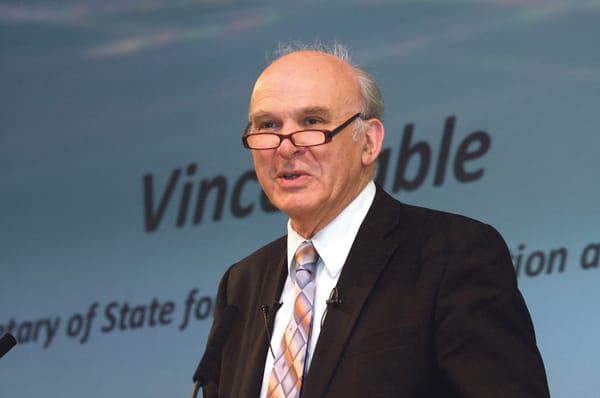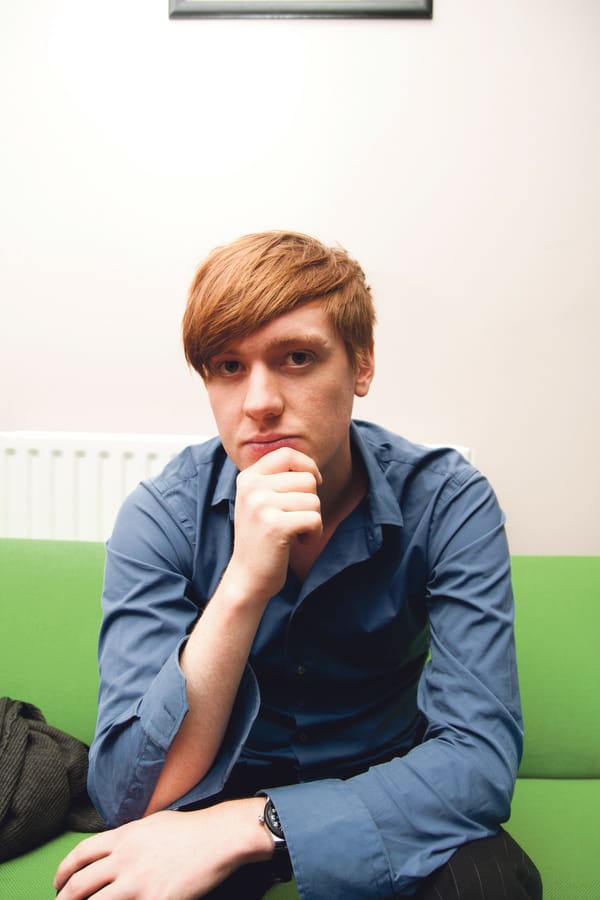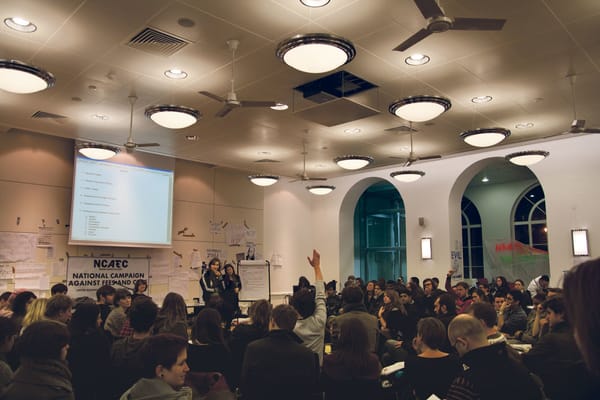Imperial finally awakens
Both lecture theatres were packed. Students and staff crowded the aisles and sat on the floor, eager to air their grievances
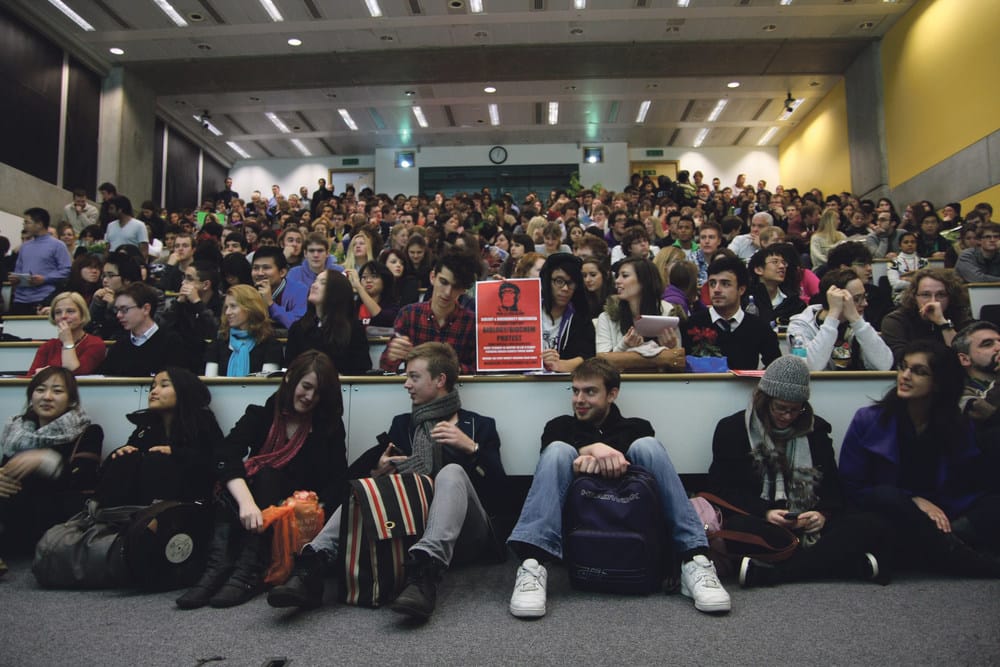
When will Imperial march?’ was the question Felix asked last week. Government cuts to higher education and tuition fees of up to £9,000 had failed to bring out the inner revolutionary in the average Imperial student. What then would it take to inflame passions on campus? The answer arrived with a flurry of leaves on Wednesday, as hundreds of students took the Life Sciences department to account over what they see as the unjustified and unjustifiable cuts being made to what is, as the department itself admits, ‘one of the largest life science groups in Europe’.
The first signs of trouble came on Imperial College Union’s Facebook page where the ominous status “early indications of the outcome of the Life Sciences restructure show that Plant Sciences is no more” was posted on Friday 2 December. Details of the cuts quickly spread on the internet (Julian Assange would be proud) and a chain reaction of outrage spread through statuses across the Imperial network. A campaign quickly followed as the Union organised a public meeting to discuss the cuts that the Head of the Life Sciences Department Ian Owens and Head of Faculty Maggie Dallman bravely agreed to attend. In a textbook example of crowd-sourcing, a protest was suggested. Defiant students would take the Plant Sciences Cuts straight to the College by dumping tomatoes, trees, leaves, twigs and all things ‘plant’ outside the Blue Cube. The activism doesn’t end there however, with an online petition also being organized, making claims of ‘faulty data analysis and lack of evidence’. Over 1100 signatures had been collected by the time of printing. Additionally so many people had planned to attend the public meeting (nearly 500) that an extra lecture theatre in the Sir Alexander Fleming building was booked to handle the overflow. With Facebook overrun by the red monkey of revolution (Viva La Evolucion!), there was a sense, on the eve of the showdown with the department, that something big was happening.
Both lecture theatres were packed. Students and staff crowded the aisles and sat on the floor, eager to hear what was to be said and to have their grievances aired and addressed. Taking the floor were Head of Department Ian Owens and Maggie Dallman, Principal of the Faculty of Natural Sciences. Professor Owens began proceedings by seeking to clarify the issue, ostensibly through the use of Powerpoint, though the slides were occasionally at the mercy of a fervent potted plant near the projector. Stressing that the “restructure is still an ongoing process”, Owens outlined two keys aims that he hoped would be achieved through the process, that of improving the department’s competitiveness both nationally and internationally and to reduce the department’s £1.5 million deficit. Stating the reasoning behind the cuts, he declared that, “a couple of the groups are unlikely to improve to the level we required until we took drastic action”. Students grew more and more restless as the hour drew on, with discontented chatting and a bored malaise blanketing the room. Professor Maggie Dallman was sure to move quickly through her speech as she sought to make the audience aware that the cuts were felt at every level, stating that she is “not some faceless administrator”. She emphasised mentioned the “uncertainty” of the situation and the challenge that they have faced in making the decisions.
Questions were then invited from an eager audience. Hands shot up as PhD students demanded assurances about funding and recent graduates expressed their disgust at the loss of some of their best-loved lecturers. Ian Owens was sympathetic to the students, agreeing that the staff lost were great teachers but taking pains to emphasise that the decision was motivated by financial troubles. He tried to reassure the students that the department would come out of the restructure stronger, and continue to provide excellent teaching even though he admitted that “losing good teachers is difficult to cope with”.
But at other points he was clearly on shakier territory. One student attacked Owens in response to his assurances that the department could survive. Said student provided the riposte, “I pay for an excellent degree, not to ‘survive’.” Passions grew as students refused to accept answers that they saw as slippery, calling out to Owens when they felt he had avoided a question. Repetitive answers began to anger the audience, with Owens frequently bringing up the “uncertainty” of the whole situation and repeating that he would not be able to comment on the cases of individual staff until January. The disgruntled audience were loath to wait and pressed him but he refused to comment further on specific courses, insisting that he had said all that he could.
Great cheers and rounds of whooping spread through the room as some questioners took the opportunity to skewer the Head of Department; one postgraduate student described with venom the “absolute disrespect” that he believes he and his colleagues have been treated with.
As the call for the last questions was announced, the students called for Kendall to land one last blow. Maggie Dallman initially refused, saying that Kendall could always speak to her easily and she wanted normal students to take full advantage of the opportunity to question her. However the roar of disapproval from the audience indicated clearly that they wanted their Union to have the last word. Kendall thanked the affected staff directly for their long commitment to the College and declared: “the choice (for affected staff) is between voluntary redundancy or an appeal, where they won’t receive any money – what kind of choice is that?” This resulted in the loudest applause of the meeting, but also gave way to a sudden rise in tension, with several individuals asking further, more accusatory questions, with one shouting that the redundancy situation was ‘blackmail’ and ‘threatening’.
As the meeting wrapped up Kendall took once more to the front and asked if the students felt like their concerns had been allayed. The audience fired back a predictable “No!” and Kendall lifted up his 6ft Christmas tree and led the students to the Faculty Building to construct their leafy memorial to the academics lost in the restructure.


